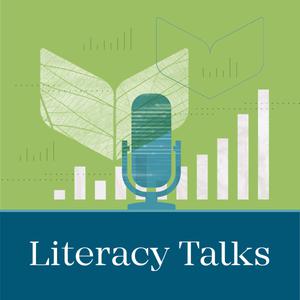
Literacy Talks
Reading Horizons
Welcome to Literacy Talks, a podcast series from Reading Horizons, where reading momentum begins. Each episode features our trio of literacy champions: Stacy Hurst, an assistant professor of reading at Southern Utah University and Chief Academic Officer at Reading Horizons; Donell Pons, a dyslexia specialist, educator, presenter, and writer, who now works with adults who struggle with reading; Lindsay Kemeny, an innovative, dedicated second-grade teacher who is a CERI certified Structured Literacy Classroom Teacher. Each episode mixes just the right blend of humor, hope, and humanity. It’s a conversation among friends, always mixed with practical literacy strategies, powerful tips, and a real passion for teachers and students alike. Listen, laugh, and learn with Literacy Talks, brought to educators everywhere from Reading Horizons.
- 1 hour 20 secondsBright Beginnings: Shaping the Next Generation of Literacy Champions
This bonus episode of Literacy Talks recaps the Bright Beginnings pre-service teacher conference. Hosted by Stacy Hurst and featuring insights from a panel of esteemed educators, Lori Anderson, Stephanie Edgren, Dr. Vicki Piquette, and Papae Wymore, the episode delves into the key sessions and takeaways from the conference.
Listeners will gain valuable perspectives on empowering pre-service teachers with the latest research and best practices in literacy instruction, from foundational skills to engaging and motivating learners. The episode highlights the collaborative spirit of the science of reading community and the passion shared by the committee in equipping the next generation of literacy champions.
SHOW NOTES
Resources:Literacy Leaders:
- Lori Anderson
- Facebook - Lori Raquel Anderson
- Stephanie Edgren
- X - @StephanieEdgren
- Facebook - Stephanie Grayson Edgren
- Instagram - @mrs.edgren
- LinkedIn - Stephanie Edgren
- Bluesky - @edgrens.bsky.social
- Dr. Vicki Piquette
- Facebook - Vicki Piquette
- Papae Wymore
- X - @PapaeWymore
- Dr. Mitchell Brookins
- Dr. Holly Lane
- Dr. Devin Kearns
- Dr. Anita Archer
- Becky Pallone
Chat about this episode in The Science of Reading Collective.
Explore the Reading Horizons Discovery® Product Suite.
Access past show notes.
Read the transcripts.8 January 2025, 12:00 pm - Lori Anderson
- 53 minutes 38 secondsAddressing Some Misunderstandings of the Science of Reading
In our Season 6 finale, the hosts dive deep into an article from The Reading League Journal that addresses common misunderstandings about the science of reading. They explore a range of topics, including the role of comprehension, the 95% claim, the debate between speech-to-print and print-to-speech, the necessity of learning spelling and syllable division rules, and the use of nonsense words in phonics instruction.
Through insightful discussions and real-world examples, the hosts help clarify misconceptions and provide a nuanced understanding of the science of reading. Whether you're a seasoned educator or new to the field, this episode offers valuable insights to help you navigate the complexities and separate fact from fiction when it comes to effective reading instruction.
SHOW NOTES
Literacy Leaders:Resources:
Chat about this episode in The Science of Reading Collective.
Explore the Reading Horizons Discovery® Product Suite.
Access past show notes.
Read the transcripts.18 December 2024, 12:00 pm - 39 minutes 4 secondsPart Two: Exploring Frustrations with Constructive Discussions
This episode of Literacy Talks focuses on the hosts' shared pet peeves related to literacy education. Donell expresses frustration with the persistent challenges around dyslexia awareness and support in schools. Stacy sometimes gets frustrated with the "checklist mentality" in teaching, where some pre-service teachers struggle to move beyond rigid requirements. Lindsay discusses her concerns about overcorrection in teaching high-frequency words and creating simplistic "black and white" lists categorizing educational practices.
The hosts emphasize the importance of nuance, context, and supporting teachers with adequate time and resources to implement evidence-based literacy instruction effectively.
SHOW NOTES
Literacy Leaders:
Chat about this episode in The Science of Reading Collective.
Explore the Reading Horizons Discovery® Product Suite.
Access past show notes.
Read the transcripts.11 December 2024, 12:00 pm - 1 hour 32 minutesDyslexia Talks: Empowering Students with Mentorship and Community Support
This episode provides a powerful and inspiring look into the work of the Joseph James Morelli Legacy Foundation, which supports high school and college students with dyslexia who wish to pursue degrees in science, technology, engineering, and mathematics (STEM) fields. Co-founder Dr. Barbara Wirostko Morelli shares her personal story of navigating the challenges of dyslexia with her own son, Joseph, and the motivation behind creating the foundation in his memory. Listeners hear from scholarship recipient Amy Mabile and mentor Jake Sussman, who offer firsthand accounts of the life-changing impact of the foundation's mentorship, community support, and financial assistance.
The episode delves into the unique obstacles students with dyslexia face in the education system, the importance of early intervention and proper documentation, and the power of resilience, self-advocacy, and finding one's voice to overcome adversity and achieve academic and personal success.
This is the final installment of the Literacy Talks miniseries Dyslexia Talks, hosted by Donell Pons.
SHOW NOTES
Literacy Leaders:Resources:
- Joseph James Morelli Legacy Foundation
- Dyslexia: Tapping into the potential | Barbara Wirostko (Morelli), MD | TEDxBozeman
- Morelli Foundation Scholarship Program
- The Forgotten Child: A Poem Dedicated to the neurodiverse
- Superpower Mentors
Chat about this episode in The Science of Reading Collective.
Explore the Reading Horizons Discovery® Product Suite.
Access past show notes.
Read the transcripts.4 December 2024, 12:00 pm - 52 minutes 57 secondsLeveraging Oral Language for Literacy Growth
This episode of Literacy Talks examines the fundamental role of oral language in student success and literacy development. The hosts - Stacy, Donell, and Lindsay - share their journeys of understanding the distinction between speech and language and how oral language forms the foundation for all literacy skills, from reading comprehension to writing. They explore practical strategies for creating a language-rich classroom environment, including techniques like the "strive for five" approach to extend student conversations.
The discussion also covers effective ways to assess oral language development and research-backed interventions to support students’ language comprehension. Throughout the conversation, the experts emphasize the long-term, far-reaching impact of prioritizing oral language instruction in the classroom.
SHOW NOTES
Literacy Leaders:- Elsa Cárdenas-Hagan
- Tricia A. Zucker
- Sonia Cabell
- Julie Washington
- Hugh Catts
- Stanislas Dehaene
- Leslie Laud
Resources:
- Right to Read inquiry report—Ontario Human Rights Commission (OHRC)
- Strive-for-Five Conversations
- Scarborough’s Reading Rope
- Literacy Talks—Comprehension: It’s the Heart of the Matter
- Seesaw
- Self-Regulated Strategy Development (SRSD)
- Evidence-based interventions for reading and language difficulties: creating a virtuous circle (Snowling & Hulme, 2011)
Terms:
- Dialogic reading: a shared reading technique that involves a conversation about a book between an adult and a child. The goal is to help the child become the storyteller while the adult listens and guides the conversation. Dialogic reading can help children develop their language and literacy skills, including oral vocabulary and listening comprehension.
Chat about this episode in The Science of Reading Collective.
Explore the Reading Horizons Discovery® Product Suite.
Access past show notes.
Read the transcripts.27 November 2024, 12:00 pm - 53 minutes 3 secondsExploring Stanislas Dehaene's Groundbreaking Research on Reading Acquisition
The trio dives into the insights and research of renowned neuroscientist Stanislas Dehaene on the cognitive science of reading. Dehaene's work has revolutionized our understanding of how the brain learns to read, from the development of the visual word form area to the neural markers of dyslexia.
The hosts unpack Dehaene's explanations of the brain's recycling of pre-existing circuits for reading, the competition and collaboration between reading and facial recognition, and the different subtypes of reading challenges. Throughout the discussion, they highlight Dehaene's practical teaching recommendations grounded in the latest neuroscience, providing educators with a roadmap to foster reading proficiency in all learners.
SHOW NOTES
Literacy Leaders:Resources:
- Video—Stanislas Dehaene Summit 2024 Virtual Keynote
- How We Learn: Why Brains Learn Better Than Any Machine . . . for Now
- Video—Eyes on Reading: Dr. Stanislas Dehaene with Emily Hanford
Terms:
- The Matthew Effect: The Matthew effect of accumulated advantage, sometimes called the Matthew principle, is the tendency of individuals to accrue social or economic success in proportion to their initial level of popularity, friends, and wealth. It is sometimes summarized by the adage or platitude "the rich get richer and the poor get poorer".
Chat about this episode in The Science of Reading Collective.
Explore the Reading Horizons Discovery® Product Suite.
Access past show notes.
Read the transcripts.21 November 2024, 4:00 pm - 46 minutes 45 secondsDyslexia Talks: Insights from Researcher and Professor of Psychology Tim Odegard
In this insightful conversation, Donell Pons sits down with Dr. Tim Odegard, a leading expert in dyslexia research. Odegard shares his personal journey as an individual with severe dyslexia and the challenges he faced with limited support and accommodations throughout his education. He also discusses his extensive professional background, including his training in cognitive sciences, neuroimaging, and dyslexia intervention.
Odegard provides valuable insights into the legislative efforts in Tennessee and other states to improve reading instruction and support for students with dyslexia, emphasizing the importance of creating an enabling context for policy implementation. This episode offers a unique perspective on the complexities of dyslexia and the critical role of empathy, advocacy, and evidence-based practices in literacy education.
This is part four of the Literacy Talks miniseries Dyslexia Talks, hosted by Donell Pons.
SHOW NOTES
Literacy Leaders:Resources:
Chat about this episode in The Science of Reading Collective.
Explore the Reading Horizons Discovery® Product Suite.
Access past show notes.
Read the transcripts.13 November 2024, 10:00 pm - 42 minutes 39 secondsExploring Frustrations with Constructive Discussions
In this thoughtful episode of Literacy Talks, our hosts engage in a reflective discussion on insights and perspectives in the field of literacy education. The conversation explores the nuances and complexities involved in implementing evidence-based practices, honoring teacher expertise, and navigating the ever-evolving landscape of literacy instruction.
Through constructive dialogue, the hosts share their professional ponderings, allowing listeners to consider alternative viewpoints and appreciate the care and dedication that goes into this vital work. Join a meaningful exploration of the literacy landscape, guided by seasoned educators committed to continuous growth and improvement.
SHOW NOTES
Literacy Leaders:Resources:
Terms:
- virgule: a slash (/), often used to show pronunciation. For example the letters -igh spell the sound /ī/.
- Dunning–Kruger effect: a cognitive bias in which people wrongly overestimate their knowledge or ability in a specific area. This tends to occur because a lack of self-awareness prevents them from accurately assessing their own skills. (Psychology Today)
Chat about this episode in The Science of Reading Collective.
Explore the Reading Horizons Discovery® Product Suite.
Access past show notes.
Read the transcripts.6 November 2024, 12:00 pm - 38 minutes 40 secondsDyslexia Talks: Spotlighting Strengths and Reshaping the Narrative with Jeffrey Conger
In this insightful conversation, Dr. Jeffrey Conger, a professor at Montana State University, shares his personal journey with dyslexia and the inspiring work he is doing to spotlight the strengths of the dyslexic mind. He provides a unique perspective on navigating education and career paths while embracing one's learning differences.
Jeff discusses the importance of developing strengths alongside addressing weaknesses and how the Dyslexia and Innovation Symposium creates a new narrative around successful individuals with dyslexia. From leveraging visual memory to distinguishing between eye-reading and ear-reading, Jeff offers valuable insights and advice for individuals, parents, and educators looking to empower those with dyslexia.
This is part three of the Literacy Talks miniseries Dyslexia Talks, hosted by Donell Pons.SHOW NOTES
Literacy Leaders:- Dr. Jeffrey Conger
- Dr. Sarah Pennington
- Dr. Waded Cruzado
- Lynsey Dyer
- Cliff Weitzman
- Linda Siegel
- David Flink
Resources:
- Dyslexia & Innovation Symposium
- Speechify
- Grammarly
- Not Stupid, Not Lazy: Understanding Dyslexia and Other Learning Disabilities
- Thinking Differently: An Inspiring Guide for Parents of Children with Learning Disabilities
Chat about this episode in The Science of Reading Collective.
Explore the Reading Horizons Discovery® Product Suite.
Access past show notes.
Read the transcripts.30 October 2024, 11:00 am - 49 minutes 37 secondsLive from The Reading League Conference 2024—Highlights and Takeaways
In this special episode of Literacy Talks, our hosts—Stacy Hurst, Donell Pons, and Lindsay Kemeny—take listeners on a journey through The Reading League National Conference 2024. Beginning the conversation live from the event, they share key takeaways from Zaretta Hammond's inspiring keynote address and highlights from sessions covering topics like fluency instruction, comprehension strategies, and the importance of inclusive literacy practices.
The hosts also discuss the vibrant conference atmosphere, the value of teacher-focused professional development, and their excitement for upcoming sessions. Listeners will gain insights into the latest trends and practical strategies in the field of literacy, all while experiencing the energy and camaraderie of The Reading League community.
SHOW NOTES
Literacy Leaders:- Zaretta Hammond
- Melissa Orkin
- Elizabeth Norton
- Molly Ness
- Ryan Lee-James
- Carolyn Strom
- Kausalai (Kay) Wijekumar
- Elsa Cárdenas-Hagan
- Dale Webster
- Wes Hoover
- Jamey Peavler
- Alex Shelton
- Stephanie Stollar
- Margaret Goldberg
- Sharon Vaughn
- Linnea Ehri
- Barbara Foorman
- Mitchell Brookins
- Pam Kastner
Resources:
- What Classroom Observations Reveal about Reading Comprehension Instruction (Durkin, 1979)
- Literacy.IO
Chat about this episode in The Science of Reading Collective.
Explore the Reading Horizons Discovery® Product Suite.
Access past show notes.
Read the transcripts.23 October 2024, 11:00 am - 37 minutes 15 secondsDyslexia Talks: Helping Students with Disabilities Succeed in College and Beyond with Christine Anderson
In this insightful conversation, Donell Pons sits down with Christine Anderson, director of the Center for Disability and Access at the University of Utah. Christine shares her personal and professional experiences working with individuals with disabilities, providing a unique perspective on the challenges students face when transitioning from high school to higher education.
They discuss the shift from the entitlement-based K-12 system to eligibility-based adult services, the importance of updated documentation, and the need for self-advocacy skills. Christine also highlights the Center's efforts to create a welcoming environment, build collaborative campus partnerships, and launch new initiatives like a peer mentorship program to support students with disabilities in reaching their full potential.
This is part two of the Literacy Talks miniseries Dyslexia Talks, hosted by Donell Pons.
Show Notes
Literacy Leaders:Resources:
- Center for Disability & Access - University of Utah
- IDEA (The Individuals with Disabilities Education Act)
- Americans with Disabilities Act (ADA)
Chat about this episode in The Science of Reading Collective.
Explore the Reading Horizons Discovery® Product Suite.
Access past show notes.
Read the transcripts.16 October 2024, 11:00 am - More Episodes? Get the App
Your feedback is valuable to us. Should you encounter any bugs, glitches, lack of functionality or other problems, please email us on [email protected] or join Moon.FM Telegram Group where you can talk directly to the dev team who are happy to answer any queries.
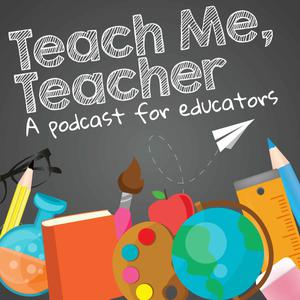 Teach Me, Teacher
Teach Me, Teacher
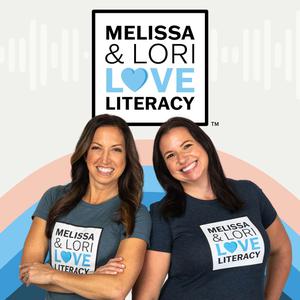 Melissa & Lori Love Literacy ™
Melissa & Lori Love Literacy ™
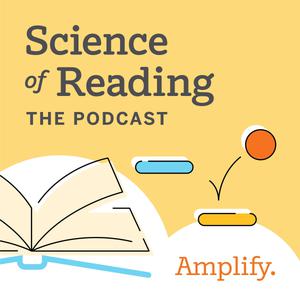 Science of Reading: The Podcast
Science of Reading: The Podcast
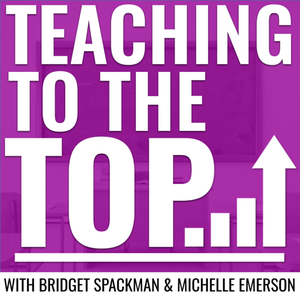 Teaching to the TOP
Teaching to the TOP
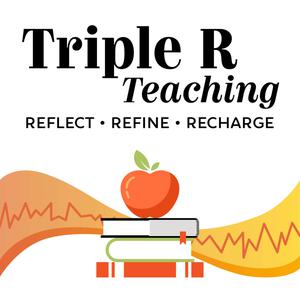 Triple R Teaching
Triple R Teaching
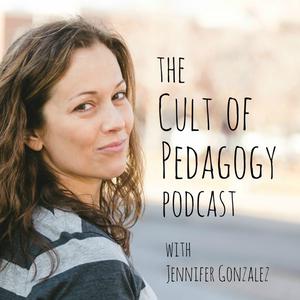 The Cult of Pedagogy Podcast
The Cult of Pedagogy Podcast